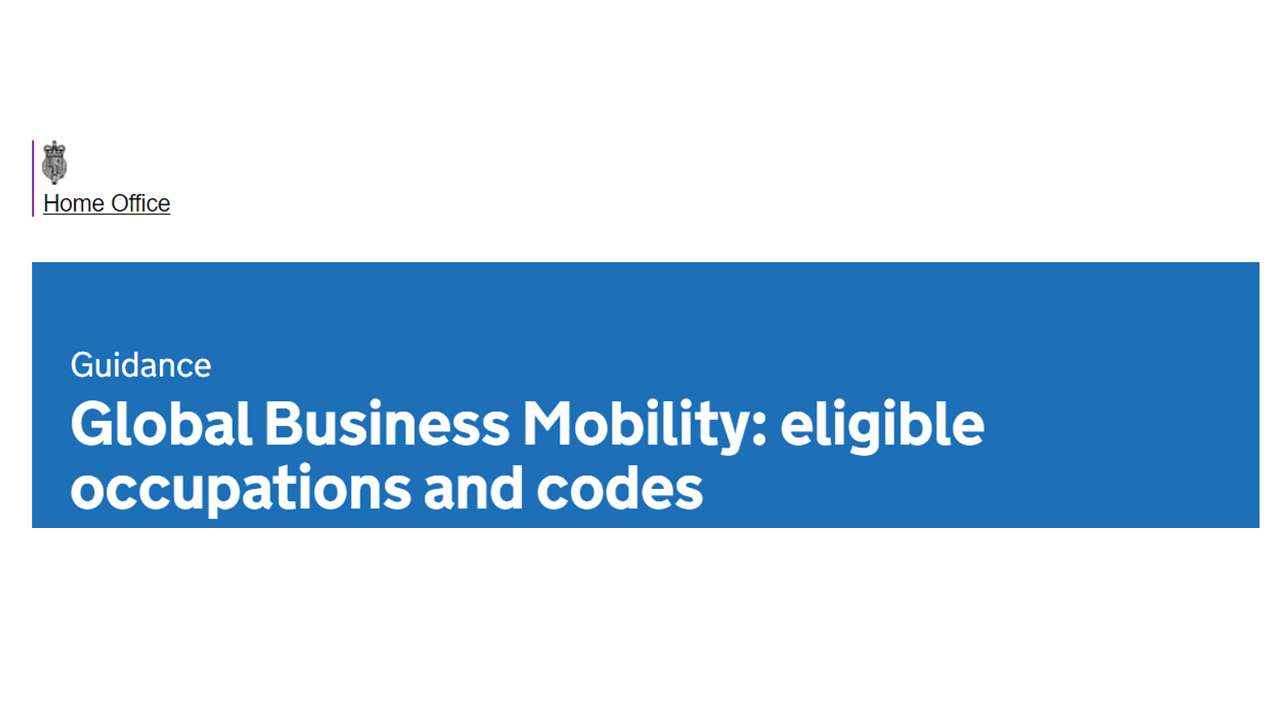The UK Expansion Worker Visa: Part 2
This article is part of the ‘Global Business Mobility’ series, which provides a detailed summary of the UK Expansion Worker Visa route.
There are three parts, which cover the following topics:
What is the Purpose of the UK Expansion Worker Visa?
3 Requirements to Satisfy
The Validity Requirements
The Form
The Fee and IHS
Biometrics
Passport and Supporting Documents
What Documents do You Need to Provide with Your Application?
Evidence of Your Employment Outside the UK
A Certificate of Sponsorship
Age
Switching
TB Test Certificate
The Suitability Requirements
Mandatory v Discretionary
The Eligibility Requirements
Points-Based Eligibility Requirements
20 Points for Sponsorship for a UK Expansion Worker
Certificate of Sponsorship
The Sponsor
The Sponsor Group
Your Job
20 Points for Job at Appropriate Skill Level for a UK Expansion Worker
The Appropriate Occupation Code
20 Points for Salary for a UK Expansion Worker
The General Salary Requirement
48 hours Per Week
The Going Rate Requirement
Non-Points-Based Eligibility Requirements
The Financial Requirement
Maximum Length of Assignments Requirement
No ILR
The Decision, Period and Conditions
What You Cannot Do
What You Can Do
When Can You Apply?
How Long Does it Take to Get a Decision?
This is part 2 of the series.
The Suitability Requirements

In very simple terms, the Suitability requirements ensure that you are of good character so that the UK society and their well-being are not endangered by your presence. You’ll find a list of all suitability requirements at part 9 of the Immigration Rules.
Mandatory v Discretionary
If you think that one or more grounds for refusal may apply to you, your application WILL or MAY BE refused. It will depend on whether the suitability requirement is a mandatory or a discretionary one. If the suitability requirement is mandatory, then the decision-maker has no choice and WILL refuse your application. If the suitability requirement is discretionary, then the decision-maker has a choice and can either allow or refuse the application.
To identify the mandatory and discretionary grounds for refusal, you need to look at the wording of the rule itself. All mandatory grounds for refusal include the word ‘must’. All discretionary grounds for refusal include the word ‘may’. For example:
9.2.2. Entry clearance or permission held by a person must be cancelled where the Secretary of State has personally directed that the person be excluded from the UK.
This rule is mandatory because of the word ‘must’. So, if there was an exclusion from the country, the decision-maker WILL refuse the application – they have no choice because it is a mandatory ground for refusal.
9.11.1. An application for entry clearance, permission to enter or permission to stay may be refused where a relevant NHS body has notified the Secretary of State that the applicant has failed to pay charges under relevant NHS regulations on charges to overseas visitors and the outstanding charges have a total value of at least £500.
The words ‘MAY BE’ in rule 9.11.1 indicate that if you have a debt to NHS of over £500, the decision-maker has a choice.
The Eligibility Requirements
The suitability requirements are the same for almost all immigration visa applications. However, the eligibility requirements are always unique. They will always be different, depending on what type of application you are making.
The UK Expansion Worker Visa is a points-based type of application. This means that all applicants will need to score at least 60 points to succeed with their UK Expansion Worker visa application.
The Eligibility Requirements for the UK Expansion Worker visa are divided into points-based and non-point-based categories.
Points-Based Eligibility Requirements
All applicants need to score 20 points for the Sponsorship. They’ll get further 20 points for proving that the job is at an appropriate skill reveal. To score the final 20 points, you’ll also need to show that your salary is at the required level.
20 Points for Sponsorship for a UK Expansion Worker
Certificate of Sponsorship
For the Sponsorship certificate to be valid, it has to be in a certain form, containing all the necessary information.
The certificate needs to:
- Confirm:
- your name and that you are being sponsored as a UK Expansion Worker
- details of your job
- salary
- any allowances (if applicable)
- PAYE details if HM Revenue and Customs (HMRC) requires that the sponsor pays income tax and national insurance for the job via PAYE; and
- include a start date for the job. It should not be later than 3 months after the date of application; and
- you cannot use the sponsorship certificate more than once. For example, when the Home Office refused or rejected your previous application or when you withdrew it.
- not have been withdrawn by the sponsor or cancelled by the Home Office; and
- confirm that you have worked for the sponsor group for at least 12 months unless you are a high earner or a Japanese national. If you are from Japan, you’ll need to provide a document to confirm that you would like to establish a UK branch or subsidiary of the sponsor group under the UK-Japan Comprehensive Economic Partnership Agreement.
- confirm whether the Academic Technology Approval Scheme (ATAS) requirement in Appendix ATAS applies.
Appendix ATAS prevents the transfer of information, knowledge or technology which could develop, advance or support an Advanced Conventional Military Technology (ACMT) and Weapons of Mass Destruction (WMD) programme or their means of delivery.
The Sponsor
The Home Office needs to authorise your sponsor to employ the UK Expansion Workers.
The Home Office should also give your sponsor an A-rating unless:
- you already worked for them as a UK Expansion Worker, and you would like to work for the same employer;
- or your sponsor has a provisional rating from the Home Office.
The Sponsor Group
When applying, you need to:
- be currently working for the sponsor group; and
- have worked outside the UK for the sponsor group for a cumulative period of at least 12 months, unless you are either:
- applying as a high earner (£73,900, based on a maximum 48-hour week); or
- a Japanese national wishing to establish a UK branch or subsidiary of the sponsor group under the UK-Japan Comprehensive Economic Partnership Agreement.
Also, you need to prove that you have been continuously working for the business in the last 12 months’ work outside the UK. The only acceptable are:
- statutory maternity, paternity, parental, or shared parental leave; or
- statutory adoption leave; or
- sick leave; or
- assisting with a national or international humanitarian or environmental crisis, with the agreement of the sponsor group; or
- taking part in legally organised industrial action.
Your Job
Needless to say, the Home Office will check that there is a genuine need for your job. In other words, the sponsor didn’t create to help you come to the UK.
20 Points for Job at Appropriate Skill Level for a UK Expansion Worker

The requirement is easy to meet. You’ll need to ensure that your proposed job is on the Appendix Skilled Occupations list.
The Appropriate Occupation Code
It is your employer’s responsibility to prove that they have chosen the most appropriate occupation code for your position. In other words, your job description has not been twisted to reduce the going rate for the proposed salary.
Continue Reading: The UK Expansion Worker Visa: Part 3
